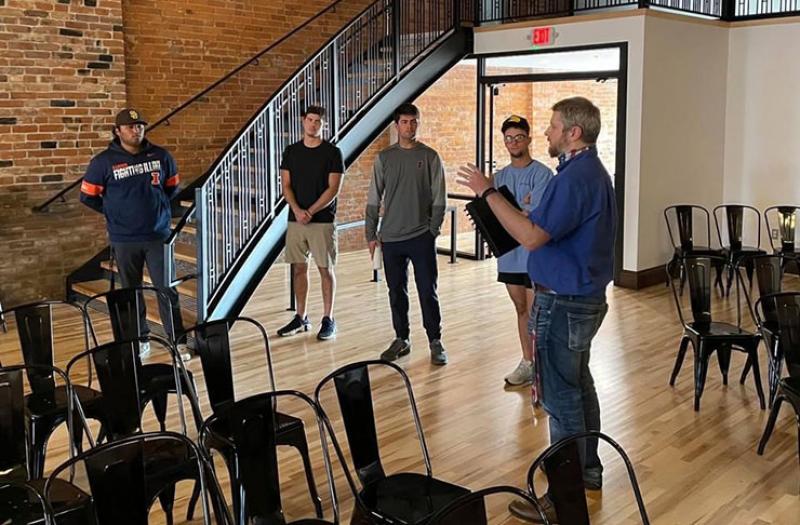
RST capstone a chance to learn about change, compassion
As a faculty member, you can hope that your course will make a lasting impact on students, and you hope they’ll learn from it. But the lofty, sometimes-elusive goal is that students will come away feeling that they can make a difference in someone’s life by utilizing what they’ve experienced.
That is the aim of RST 460 Event Management, and RST 465 Event Implementation and Evaluation. The two-course, event capstone series, taught by Teaching Associate Professor Mike Raycraft and adjunct instructor Robyn Deterding in the Department of Recreation, Sport and Tourism, examines the core basics from idea generation through initial planning stages, according to the course description, and then through execution. The two-course sequence was introduced into the curriculum three years ago.
The event planning classes involve students working with one of 13 local agencies (such as the Champaign Park District, the Parkland College Office of Student Life, University Housing at Illinois, Research Park, and Don Moyer Boys and Girls Club) to develop and plan an event from conception to execution. The students work in groups of anywhere from three to 17, depending on size of the event, and then they have deliverables to the instructor (Raycraft and Deterding), as well as to the agency liaison.
“The students do an amazing job,” Deterding said. “Part of this (course) is we’re trying to get them ready; these are senior-level students, so they’re going to be going out and doing their internships (next).”
For example, one project RST students are working on currently is One Winter Night, CU at Home’s annual fundraising event that gives the community the opportunity to raise awareness of homelessness.
“They do everything from marketing to (managing) the volunteers to management of the box dwellers,” Deterding said. “It just it depends on what (CU at Home Community Outreach and Development Director) Rob (Dalhaus) needs and what his team needs.”
“I decided to work with CU at Home because driving through Chicago you can see people sleeping outside, in tents, and under bridges,” said RST senior Diego Acosta, one of the five students working on the One Winter Night event. “I always find it really sad to see people living outside, especially in the harsh Chicago winters. So when I saw the opportunity to work with an organization that provides resources to people in that situation, I immediately jumped on board.”
For the first time this year, One Winter Night—which because of heavy snowfall moved its main location in downtown Champaign to the parking lot north of event headquarters, The Venue CU, 51 E. Main St.—will have a satellite site on the Quad on the UIUC campus, Dalhaus said. “I am super excited for the One Winter Night event mainly because this is the first year CU at Home is partnering with the University of Illinois and hosting a satellite location on the Main Quad as well as the original location in downtown Champaign,” Acosta said. “I am really excited for the university community to be able to witness the event and hopefully even participate.”
On Feb. 4, when the event is scheduled to take place, RST students will be on hand at both the main One Winter Night site and the Quad. But the culmination of the event is just the final step in a long process, with heavy involvement from the students.
“One of the students is helping put together PowerPoint presentation of all of our business sponsors that will be played throughout the night of the event,” Dalhaus said. “We're actually livestreaming the event for 13 hours, so we've got a student working on that, putting all the business sponsors on the slides. We've got one student that's focused on hospitality that night, so overseeing all of the food and drinks and those types of things that'll be at the event headquarters. We've got a couple of guys working on kind of social media presence. We've got another student who is helping out with registration. We've got another one that's going to be helping with accounting that night.”
Dalhaus expects approximately 150 people to turn out on Feb. 4, but expects that more people will be involved and donate, thanks to the livestream.
“Adding the live stream, adding the online giving, adding Venmo, those types of things have really expanded our abilities to collect those donations,” he said.
For Acosta, the chance to work on a “real-world event” was one of the most important parts of the capstone courses.
“It is not a made-up event that I have created and need to write a paper on it,” Acosta said. “I am a big fan of real-world work compared to traditional schoolwork. The classes also expose students to organizations that they may not even know existed. In my case, I had no idea CU at Home was an organization before taking the classes. I am glad I can help them organize such an important event to be able to help the Champaign-Urbana homeless community.”
